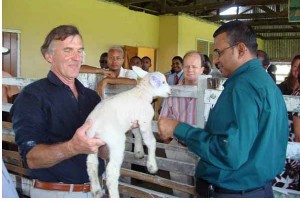More than 40 lambs from the Texel embryo transfer programme conducted at the Nat-ional Agriculture Research Institute (NARI) have so far been born with many more on the way.

A British High Commis-sion press release said that the embryo transfer took place in April this year, and was a collaborative effort of the Government of Guyana, the British High Commission and the UK Department for International Development (DFID) and the British Texel Sheep Society. Just over 100 pure British Texel embryos were implanted in 97 Barbados Black Belly ewes.
British High Commiss-ioner Fraser Wheeler said the outcome so far was a tremendous success and testament to the hard work put in by NARI under “challenging conditions. This programme, including the capacity building at NARI will make a significant contribution to the diversification of agriculture in Guyana.”
Meanwhile a Ministry of Agricultural press release said the use of embryo implants to acquire new breeding animals was cheaper than the cost of importing a Texel animal, which would cost US$5,000 ($1 million).
The release said Minister Robert Persaud had mandated NARI to carry out more implants and to improve its facilities and security for the animals. It further said that Guyana was the first Caribbean and South American country to acquire this type of breed and it should be seen as a major development in the livestock industry.
The embryo transfer programme was done with the intention of creating pure breed Texel sheep for breeding purposes at NARI and an average success rate of 50-60 per cent was considered an excellent outcome, the BHC release said.
In another programme run at the same time at NARI, the Guyana School of Agriculture (GSA) and four farms in the regions, Barbados Black Belly sheep were artificially inseminated with Texel semen to produce the first cross bred Texel/Barbados Black Belly. The aim of this programme is to produce a cross breed sheep (Texana) which has the toughness and adaptability of the Barbados Black Belly but with a much improved carcass weight. According to the BHC release, Tim Healy Chairman of the British Texel Sheep Society, who has been involved with the project from the start, has been in Guyana all week working with NARI team at the farm. Healy who donated all the Texel embryos from his own flock in the UK said he was delighted at the quality of lambs produced in Guyana “The Barbados Black Belly sheep are excellent mothers and are milking well. The lambs are increasing in size and weight rapidly and the cross breeds are sturdy looking lambs which appear to be taking on the characteristics of both breeds,” Healy said.
Healy and the NARI team are hoping to add “block lambing” (when a large number of ewes are synchronised to lamb at a specific time) to the system at NARI and also hope to assist interested farmers in acquiring the necessary knowledge and skills to adapt the same measures at their farms, since it is a highly efficient and productive way of managing a flock.
Meanwhile, when the Texel rams mature, arrangements will be made for interested farmers to use them and the cross-breed rams (Texanas) for breeding purposes through NARI.





